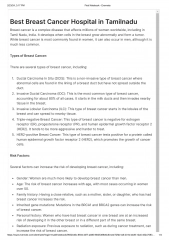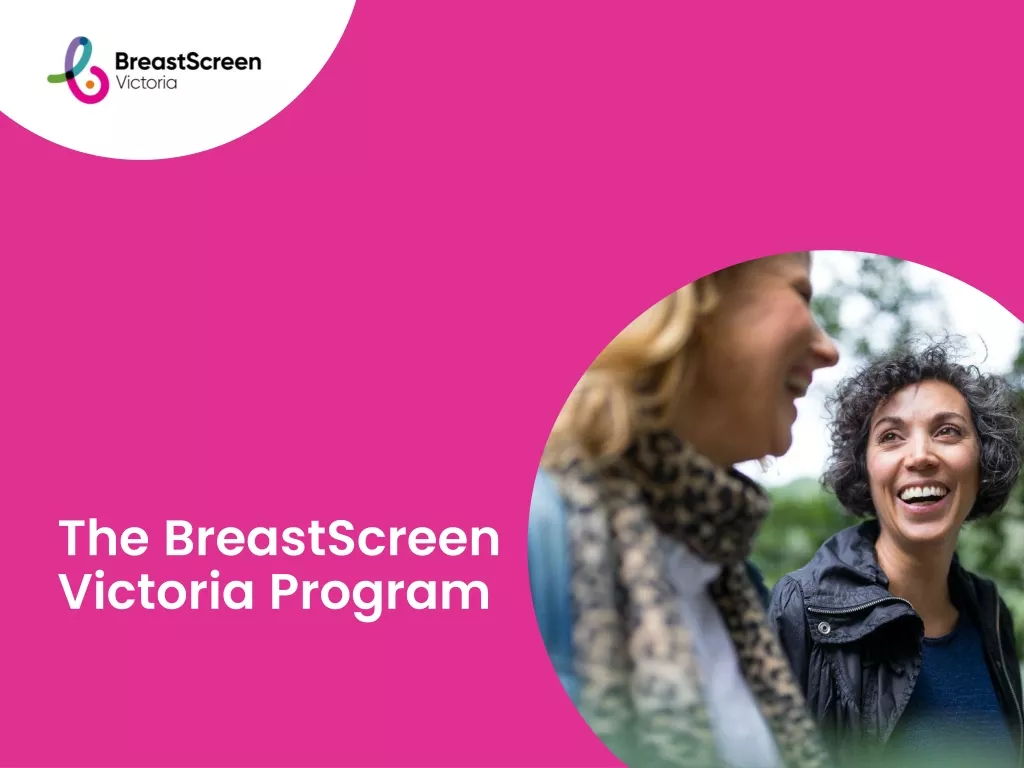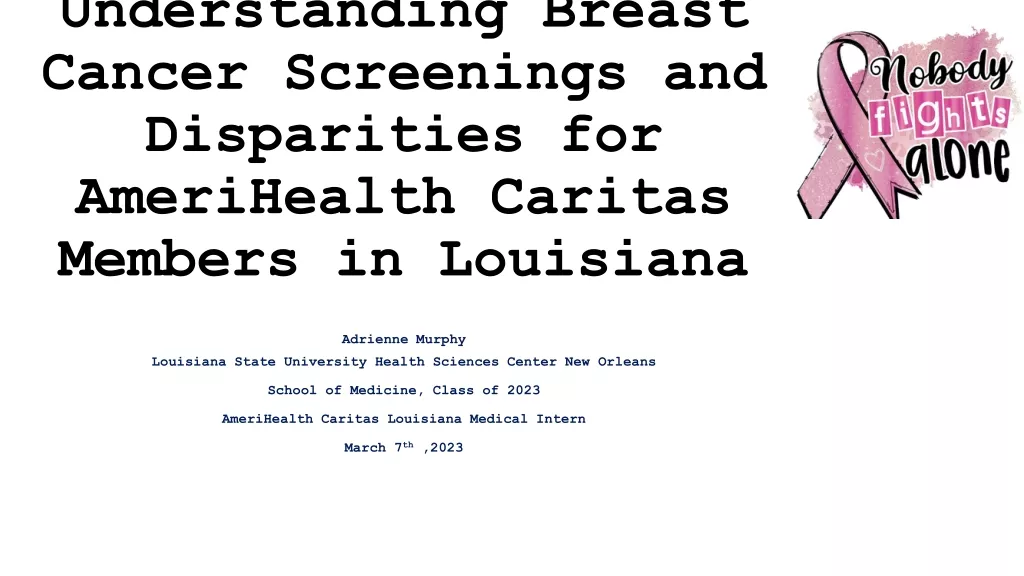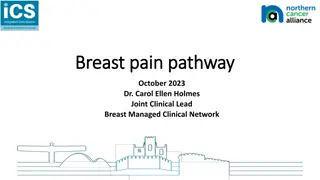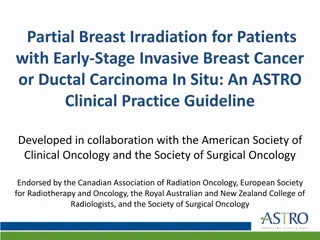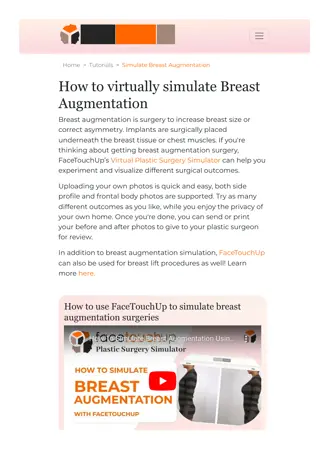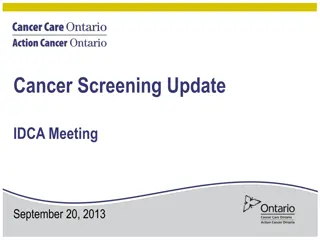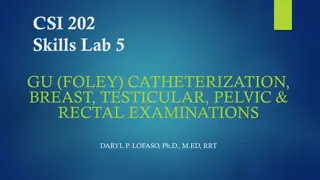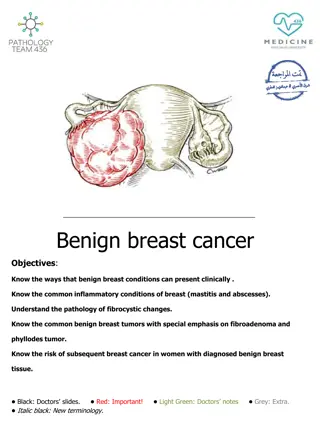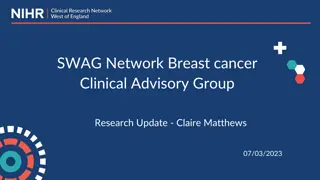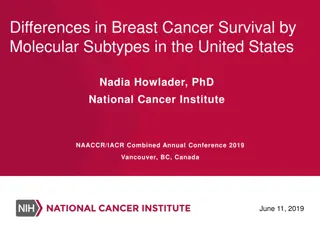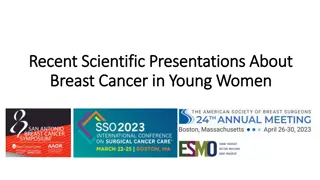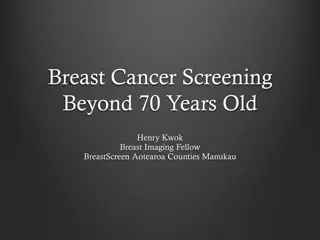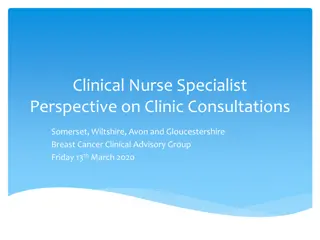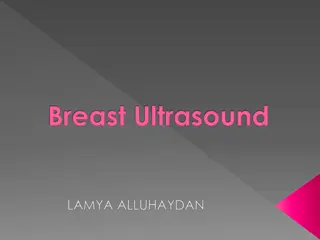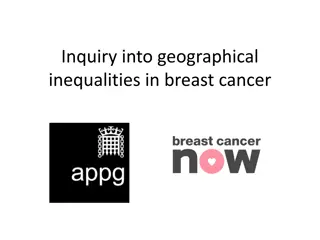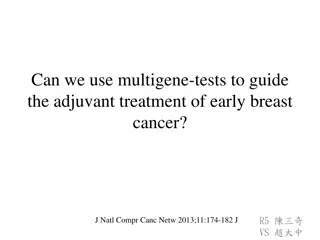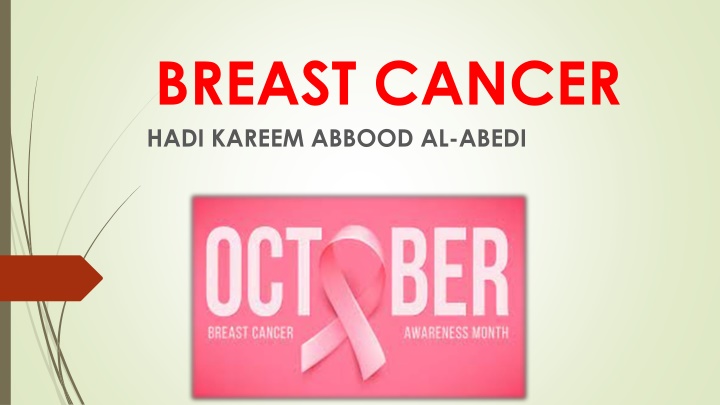
Understand Breast Cancer Risk Factors and Prevention
Learn about breast cancer, its causes, risk factors, and preventive measures. Discover how age, genetics, lifestyle choices, and ethnicity impact the likelihood of developing breast cancer. Find out who is at high risk and how to reduce the chances of getting this disease.
Download Presentation

Please find below an Image/Link to download the presentation.
The content on the website is provided AS IS for your information and personal use only. It may not be sold, licensed, or shared on other websites without obtaining consent from the author. If you encounter any issues during the download, it is possible that the publisher has removed the file from their server.
You are allowed to download the files provided on this website for personal or commercial use, subject to the condition that they are used lawfully. All files are the property of their respective owners.
The content on the website is provided AS IS for your information and personal use only. It may not be sold, licensed, or shared on other websites without obtaining consent from the author.
E N D
Presentation Transcript
BREAST CANCER HADI KAREEM ABBOOD AL-ABEDI
What is a cancer? cancer: a group of disorders characterized by abnormal cell proliferation, in which cells ignore growth- regulating signals in the surrounding environment
How does cancer happen? Cancer is a disease process thatbeginswhen a cell is transformedby geneticmutationsofthecellular DNA. Geneticmutationsmaybe inheritedand/oracquired, leadingtoabnormalcellbehavior
BREAST CANCER Breast cancer is a major health problem in the world. Current Statistics indicate that over a lifetime (birth to death), a woman is at risk Developing breast cancer is about 12%, or one in eight. Female breast cancer incidence rates vary substantially by race and ethnicity.
Risk Factors You Cannot Change Getting older. The risk for breast cancer increases with age. Genetic mutations. Women who have inherited changes (mutations) to certain genes, such as BRCA1 and BRCA2. Reproductive history. Starting menstrual periods before age 12 and starting menopause after age 55 expose women to hormones longer. Having dense breasts. Dense breasts have more connective tissue than fatty tissue.
Risk Factors You Can Change Not being physically active. Being overweight or having obesity after menopause. Taking hormones. Some forms of hormone replacement therapy (those that include both estrogen and progesterone). Reproductive history. Having the first pregnancy after age 30, not breastfeeding, and never having a full- term pregnancy can raise breast cancer risk. Drinking alcohol.
Race/Ethnicity White women are slightly more likely to develop breast cancer than Black, Hispanic, and Asian women.
Who Is at High Risk for Breast Cancer? If you have a strong family history of breast cancer or inherited changes in your BRCA1 and BRCA2 genes, you may have a high risk of getting breast cancer.
warning signs of breast cancer New lump in the breast or underarm. Thickening or swelling of part of the breast. Pulling in of the nipple or pain in the nipple area. Any change in the size or the shape of the breast. Pain in any area of the breast.
How Is Breast Cancer Diagnosed? Breast ultrasound. Diagnostic mammogram. Breast magnetic resonance imaging (MRI). Biopsy.
How Is Breast Cancer Treated? Surgery. An operation where doctors cut out cancer tissue. Chemotherapy. Using special medicines to shrink or kill the cancer cells. Hormonal therapy. Blocks cancer cells from getting the hormones they need to grow. Biological therapy. Works with your body s immune system to help it fight cancer cells or to control side effects from other cancer treatments. Radiation therapy. Using high-energy rays to kill the cancer cells.
Being physically active can help lower your risk of getting breast cancer.
What Can I Do to Reduce My Risk of Breast Cancer? Keep a healthy weight. Be physically active. Choose not to drink alcohol. If you are taking, or have been told to take, hormone replacement therapy or oral contraceptives (birth control pills), ask your doctor about the risks and find out if it is right for you. Breastfeed your children, if possible. If you have a family history of breast cancer or inherited changes in your BRCA1 and BRCA2 genes, talk to your doctor about other ways to lower your risk.
Surveillance Cancer surveillance is the collection of information about cancer, including Which groups of people were diagnosed with breast cancer. How far the breast cancer had spread at the time it was diagnosed. How the cancer was treated.
Breast Cancer Awareness Month October is Breast Cancer Awareness Month, which is a worldwide annual campaign to increase awareness and to promote regular screening and early detection of breast cancer.

